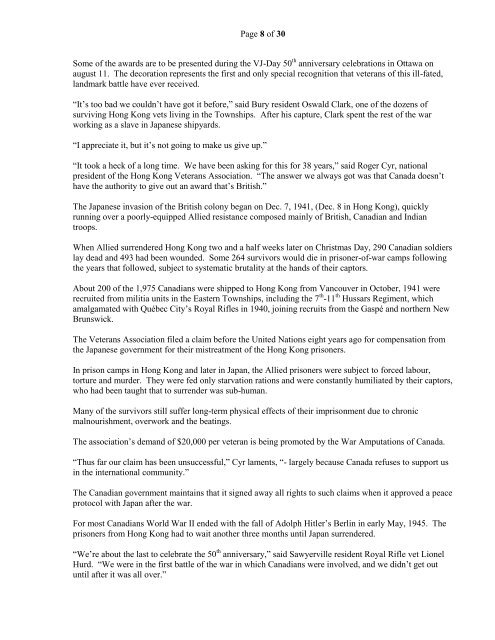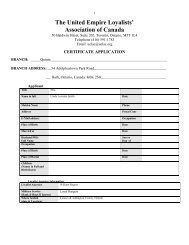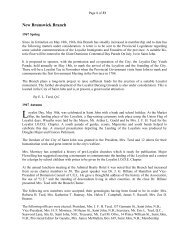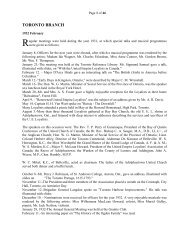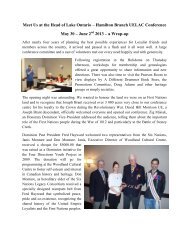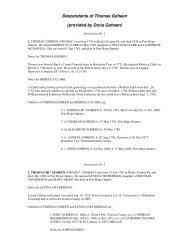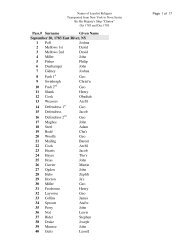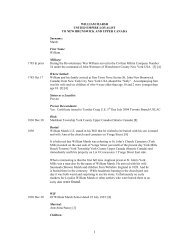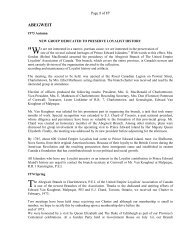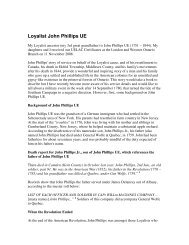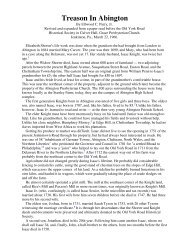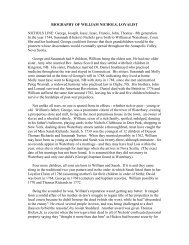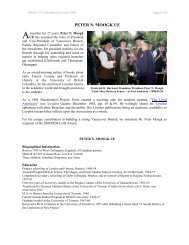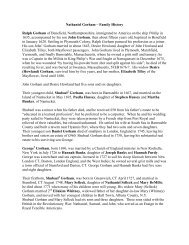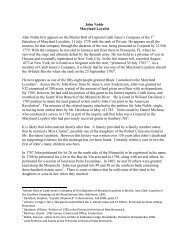Little Forks Branch reports - for United Empire Loyalists
Little Forks Branch reports - for United Empire Loyalists
Little Forks Branch reports - for United Empire Loyalists
You also want an ePaper? Increase the reach of your titles
YUMPU automatically turns print PDFs into web optimized ePapers that Google loves.
Page 8 of 30<br />
Some of the awards are to be presented during the VJ-Day 50 th anniversary celebrations in Ottawa on<br />
august 11. The decoration represents the first and only special recognition that veterans of this ill-fated,<br />
landmark battle have ever received.<br />
“It’s too bad we couldn’t have got it be<strong>for</strong>e,” said Bury resident Oswald Clark, one of the dozens of<br />
surviving Hong Kong vets living in the Townships. After his capture, Clark spent the rest of the war<br />
working as a slave in Japanese shipyards.<br />
“I appreciate it, but it’s not going to make us give up.”<br />
“It took a heck of a long time. We have been asking <strong>for</strong> this <strong>for</strong> 38 years,” said Roger Cyr, national<br />
president of the Hong Kong Veterans Association. “The answer we always got was that Canada doesn’t<br />
have the authority to give out an award that’s British.”<br />
The Japanese invasion of the British colony began on Dec. 7, 1941, (Dec. 8 in Hong Kong), quickly<br />
running over a poorly-equipped Allied resistance composed mainly of British, Canadian and Indian<br />
troops.<br />
When Allied surrendered Hong Kong two and a half weeks later on Christmas Day, 290 Canadian soldiers<br />
lay dead and 493 had been wounded. Some 264 survivors would die in prisoner-of-war camps following<br />
the years that followed, subject to systematic brutality at the hands of their captors.<br />
About 200 of the 1,975 Canadians were shipped to Hong Kong from Vancouver in October, 1941 were<br />
recruited from militia units in the Eastern Townships, including the 7 th -11 th Hussars Regiment, which<br />
amalgamated with Québec City’s Royal Rifles in 1940, joining recruits from the Gaspé and northern New<br />
Brunswick.<br />
The Veterans Association filed a claim be<strong>for</strong>e the <strong>United</strong> Nations eight years ago <strong>for</strong> compensation from<br />
the Japanese government <strong>for</strong> their mistreatment of the Hong Kong prisoners.<br />
In prison camps in Hong Kong and later in Japan, the Allied prisoners were subject to <strong>for</strong>ced labour,<br />
torture and murder. They were fed only starvation rations and were constantly humiliated by their captors,<br />
who had been taught that to surrender was sub-human.<br />
Many of the survivors still suffer long-term physical effects of their imprisonment due to chronic<br />
malnourishment, overwork and the beatings.<br />
The association’s demand of $20,000 per veteran is being promoted by the War Amputations of Canada.<br />
“Thus far our claim has been unsuccessful,” Cyr laments, “- largely because Canada refuses to support us<br />
in the international community.”<br />
The Canadian government maintains that it signed away all rights to such claims when it approved a peace<br />
protocol with Japan after the war.<br />
For most Canadians World War II ended with the fall of Adolph Hitler’s Berlin in early May, 1945. The<br />
prisoners from Hong Kong had to wait another three months until Japan surrendered.<br />
“We’re about the last to celebrate the 50 th anniversary,” said Sawyerville resident Royal Rifle vet Lionel<br />
Hurd. “We were in the first battle of the war in which Canadians were involved, and we didn’t get out<br />
until after it was all over.”


